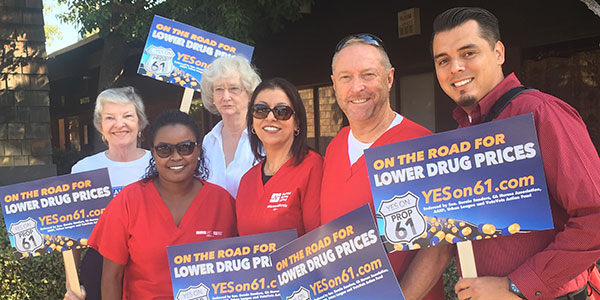Press Release
New Nurses’ Research Report on Prop 61 - How Big Pharma Manipulates Patent Laws to Protect Profits

Major pharmaceutical corporations exploit patent law, including with minor variations on existing drugs, to protect and expand their windfall profits, according to the latest in a series of research reports released today by the California Nurses Association/National Nurses United.
In “Game of Patents,” the new research study notes that “pharmaceutical companies are gaming the patent process to maintain and prolong their drug monopolies, adding billions to the costs of health care every year” – at the expense of patients harmed by skyrocketing drug prices.
The report may be read on line at http://nationalnursesunited.org/gameofpatents
“What this report helps expose is a corporate shell game,” said CNA/NNU Co-President Deborah Burger, RN. “The pharmaceutical companies get government protection through patents and ‘market exclusivity’ rights for high cost brand name drugs. As a result, the drug companies are handed a monopoly with a blank check to inflate their prices and accumulate enormous profits while blocking patient access to cheaper, often life saving generic medications.”
“In California, we can set a national model for how to begin to rein in the drug companies by passing Prop. 61 on the California November ballot to lower drug prices,” Burger said.
“Game of Patents” is the third in the series of pharmaceutical research policy statements from CNA’s research arm, the Institute for Health and Socio-Economic Policy. They can be viewed at http://www.nationalnursesunited.org/pages/research
Here’s how the “Game of Patents” works – a four-part scheme in the view of CNA.
- The initial patents have a 20-year life span. With pharmaceuticals, the Food and Drug Administration can grant the companies exclusive marketing rights for up to an additional seven years. During that long span, the drug firm has monopoly control, meaning no cheaper generic version can be introduced into the market, permitting the drug manufacturer to “make huge profits because they are able to charge high prices without fear of competition,” the paper notes.
- “Evergreening.” The drug company makes a very minor modification on an existing brand name drug, such as tweaking one molecule, which does little to make the drug more effective, but is considered to be “better than a placebo.” That can re-start the monopoly protection time span all over for the “new” drug.
- Improving the medical device that administers the drug. Through this approach the drug company treats the drug and the device as an inseparable pair, allowing it to also extend the patient protection and delay introduction of the cheaper generic alternative.
- “Pay-for-delay.” As the monopoly patent protection is about to finally expire, the drug company will pay off a competitor to delay release of the generic version of the drug. In 2010 the Federal Trade Commission estimated that the pay-for-delay scheme cost consumers over $3.5 billion a year alone, primarily through the increased costs of the original brand name drug.
Here’s one example of how the “Game of Patents” can play out.
Suprenza, a weight loss drug is currently owned by Alpex Pharma and distributed by Citius Pharma. Alpex filed the patent in July, 1998, with it set to expire in July 2018. But in 2009, Alpex Pharma filed another patent making a slight change in the appearance.
Alpex described the change this way: “Orally disintegrating tablets containing colored granules of a water-soluble sugar which give them a speckled appearance are described. The orally disintegrating tablets with speckled appearance are readily and easy identifiable by physicians, nurses and patients.” Not a new, improved drug, just a change in appearance.
The patent was granted, extending monopoly protection to 2029, an extra 11 years for “colored granules of a water-soluble sugar which give them a speckled appearance.” For a grand total of 31 years of higher priced patent protection for Seprenza.
“It may be a game to the drug companies, but it can mean life and death to patients who are unable to afford the skyrocketing costs of these high-priced medications. We can take a stand against the drug companies by passing Prop. 61,” Burger said.
Under Prop. 61, the state would be required to pay no more for prescription drugs for patients it covers than the discount prices, which can be up to 40 percent less, paid by the Department of Veterans Affairs. CNA, the largest nurses organization in California, has been campaigning for Prop. 61, citing the calamitous effects on patients harmed by high drug prices.